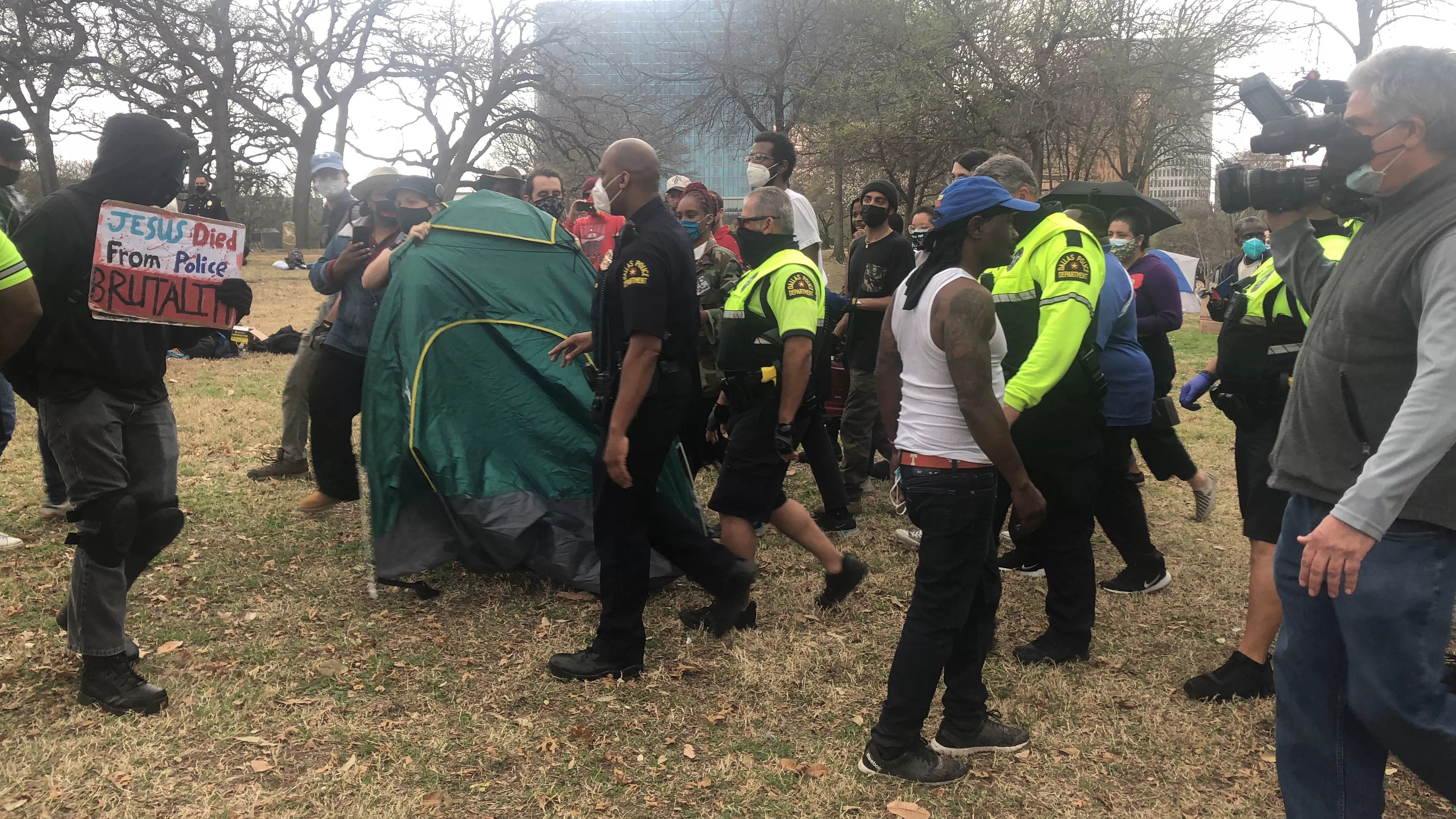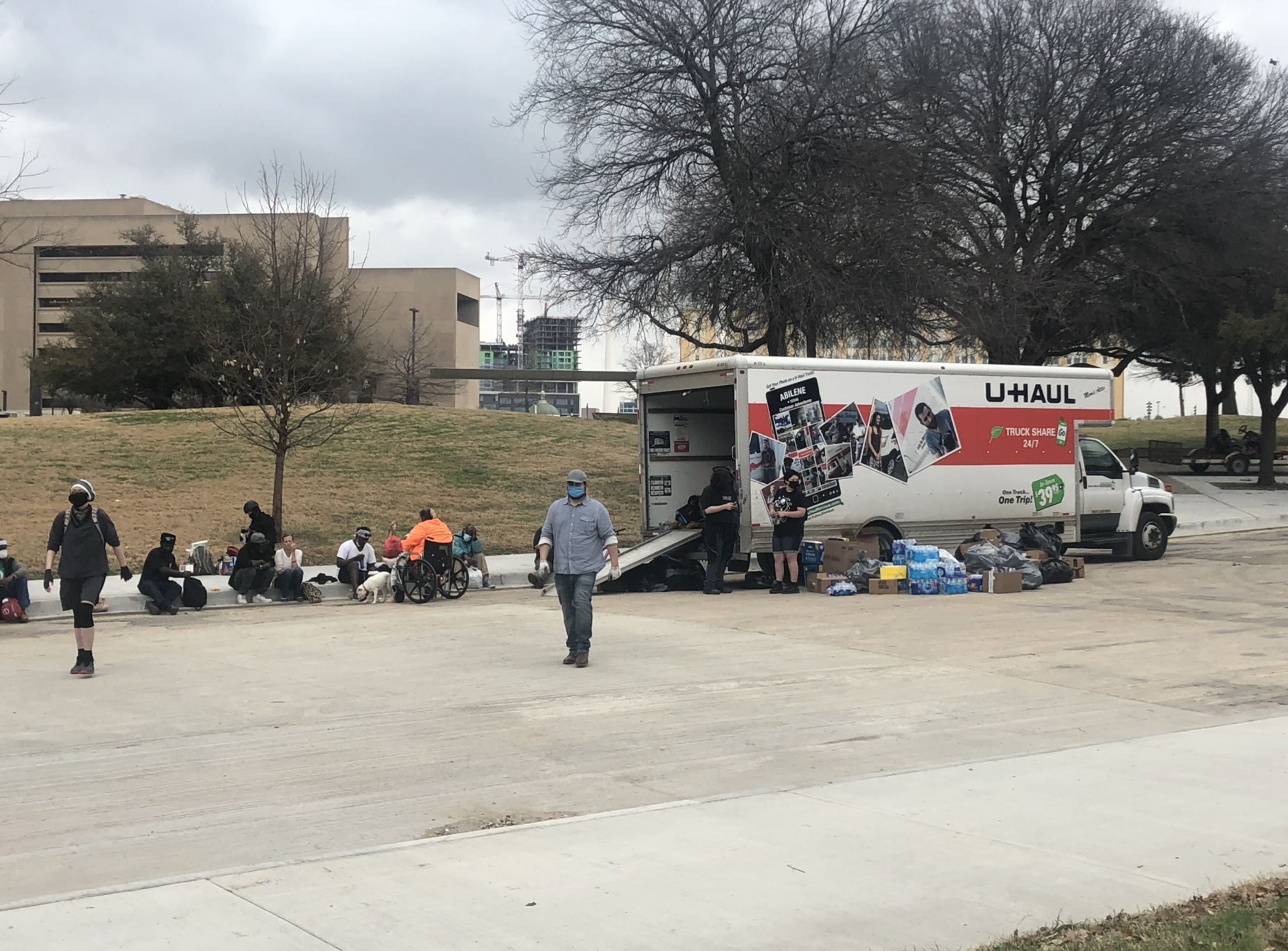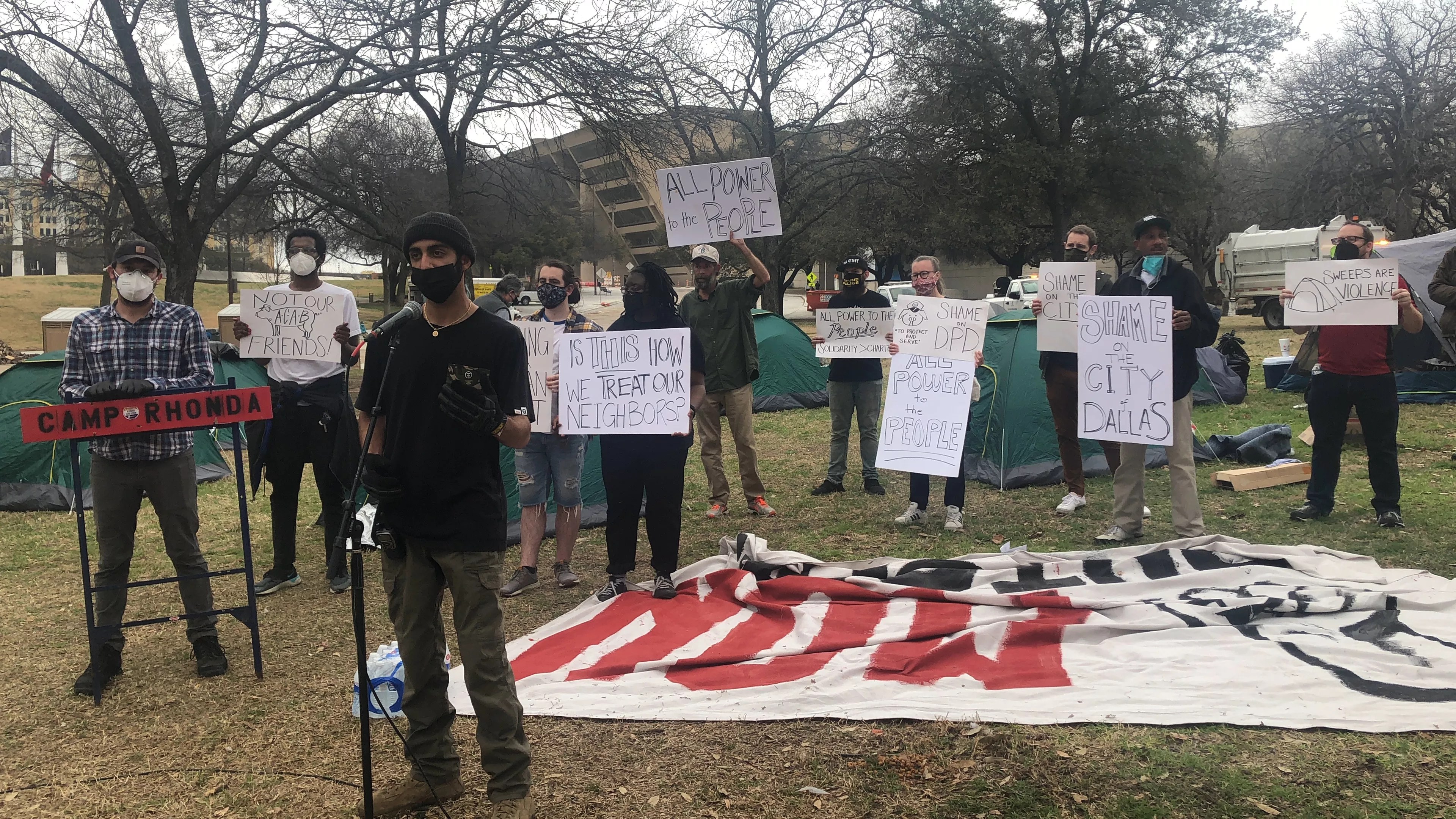
Jacob Vaughn

Audio By Carbonatix
Under a light drizzle on Friday, the homeless inhabitants of Camp Rhonda, an embattled community that has moved from one site to another, frantically packed their belongings in Pioneer Plaza. The city had given them a deadline to leave, and time was running out.
Camp Rhonda moved to the plaza last week to protest the city’s ongoing sweeps of homeless encampments and its unwillingness to find solutions for the homeless population. Along with the activists who came to their aid, Camp Rhonda’s homeless have demands. They want a seat at the table with city officials, a voice in any conversation about solutions and a safe place where they won’t have to worry about sweeps.
“We need to put pressure on the city to allocate these things,” Ryan Ahmadian, cofounder of the Dallas Houseless Committee and a member of Dallas Stops Evictions, told the Observer. The Dallas Houseless Committee is a coalition of activist groups seeking more solutions to homelessness.
Instead, the city gave them 24 hours to leave before they conducted a sweep at Pioneer Plaza, a short walk from City Hall.
In a statement emailed to the Observer, a city spokesperson said shelter was offered to all the homeless who showed up at the plaza. “This particular encampment is on, not only parks land, but also a historic cemetery,” the city spokesperson said. “The group submitted a First Amendment protest application, which was denied, so the site is not sanctioned, however, the Office of Homeless Solutions has given them time to access resources and COVID-19 testing.”

Michael Jones said he’s gotten good at being homeless, but he wants to get back on his feet.
Jacob Vaughn
Someone handed Michael Jones, 60, a couple of burgers and a clean pair of socks as he packed his belongings. As he ate, Jones explained he’d been living on the street near the West End when someone told him about the camp at Pioneer Plaza. He learned he could get a new sleeping bag and tent if he went to the plaza. He didn’t realize that just a couple of days later, he’d be packing up his new tent and sleeping bag to find another place to camp. He said he became homeless after his girlfriend went to jail the same week his grandmother died. “I thought God had betrayed me,” he said. “I walked away from everything.”
He said for a year, he cursed God. “I realized that probably wasn’t the smartest thing, so I stopped cursin’ him and it’s been working since then.”
But he’s still pessimistic. “I don’t think [God] pays attention anymore,” he said, eating his burger. “We’ve got a pandemic going on. Is he paying attention or is he letting all the old people die?”
You move in and out of homelessness, he said. He’ll get a girlfriend and rent an apartment with her. Then, “your relationship falls apart, you’re back in homelessness,” he said.
Jones has gotten good at being homeless, he said, and being able to navigate through the shelters and different services the city provides. The shelters are supposed to be the homeless’ entry point into getting affordable housing and starting a new life. But they’re not the most comfortable and the process can be long and grueling. Jones’ last stay at Salvation Army’s shelter lasted 64 days. “I hadn’t even gotten a caseworker yet,” he said. “It’s always going to be a throw of the dice whether you get housing or not.”
A huge part of the problem is capacity, OurCalling’s Wayne Walker told the Observer. Before the pandemic, Dallas had around 2,000 available shelter beds, according to the city’s website. But social distancing protocols at shelters have sliced that number. Getting more space for shelters or affordable housing usually meets resistance.
Jones expects to receive Social Security soon, though, and hopes to get back on his feet with the money. In the meantime, he may head to the local shelter Austin Street Center.

The campers’ deadline to leave had arrived.
Jacob Vaughn
As everyone scrambled to pack their belongings Friday, Dallas cops started to encircle the area. OHS staff walked amongst the campers offering them services and a stay at a shelter or hotel. Some went with them. Others didn’t. Their deadline to leave was approaching.
Dallas Police Department officers formed a line and drove forward through the camp, at least one attempting to snatch up people’s property as they moved. The cops were swarmed by activists and campers. Amid the commotion, a woman broke down crying, saying they didn’t know where else to go.
A standoff followed. A line of activists formed across the column of cops, who had zip ties in hand. They stood there, activists hurling insults at the cops, as people packed their belongings into the back of a UHaul to be taken to another place where the city could eventually send them packing yet again. It’s a game of cat and mouse.
The original Camp Rhonda, near Interstate 45 and Ferris Street, was a reaction to encampment resolutions, or sweeps, that were taking place near downtown. During the sweeps, police officers tossed out people’s belongings, including identification cards, birth certificates and other important documents.
The city gives campers 72 hours advance notice to clear off of a property they’ve pitched tents on. After three days, people hired by the city would then arrive to drive away anyone still there and haul off whatever items are left behind.
Following guidance from the Centers for Disease Control and Prevention, Dallas claimed it would cut the homeless campers some slack in a December memo. Per the CDC guidance, the Dallas Police Department, Office of Homeless Solutions and city-contracted vendors said they temporarily suspended their anti-encampment efforts. The goal was to ensure these homeless populations didn’t contract COVID-19.
But the city has since resumed the sweeps. The Observer was able to confirm the city recently swept a camp at U.S. 75 and Forest Lane. OHS had about $500,000, and the water department got $250,000 last year to conduct these sweeps.

People packed their belongings into the back of a UHaul before they could be taken by the city.
Jacob Vaughn
Camp Rhonda started with three tents. The number quickly swelled to more than 20. Eventually, Johnny Aguinaga, the property owner and candidate for City Council’s District 4 seat, let the residents stay on his land.
Aguinaga announced that the properties housing Camp Rhonda, and a smaller one named Camp Joy, would be shut down after Dallas code compliance staff warned him the land was being used illegally by his allowing homeless people to camp there. The city threatened to fine him up to $2,000 a day if he didn’t shut it down.
In a statement emailed to the Observer, a city spokesperson said, “Code Compliance educates property owners on what they need to do to comply with city code for the health and safety of all.”
Groups with the Houseless Committee raised hundreds of thousands of dollars during the recent winter storm. The money paid for a two-week hotel stay for Camp Rhonda residents. Their last day in a hotel was March 9. They had nowhere else to go and wanted to make a statement to the city. So, they set up a new camp at Pioneer Plaza.

Ryan Ahmadian, co-founder of the Dallas Houseless Committee and a member of Dallas Stops Evictions, said they were ready to cooperate with the city, but the city wasn’t willing to cooperate with them.
Jacob Vaughn
About 4,500 people in Dallas experienced some form of homelessness in January 2020, according to the Metro Dallas Homeless Alliance, which conducts the annual count of Dallas and Collin counties’ homeless populations.
The last annual count of homeless populations in Dallas found that after years of increases, the city saw fewer people experiencing homelessness. It also found the city’s efforts were successful in moving those people from one place to another, but not getting them off the streets and into housing.
There’s a pretty big disparity in the homeless population. Black people make up less than one-fifth of Dallas’ population but are the majority of the city’s homeless, according to a study that found low-paying jobs, criminal records and a shortage of affordable housing contributed to keeping people homeless.
As for Camp Rhonda, the original plan was to stay put until the city agreed to their demands. But the standoff ended when two paddy wagons and a line of other police cars rolled up onto Young Street.
The city, however, released a memo released Friday, claiming the protesters had escalated the situation. Only four tents needed to be removed by Parks staff at the end of the day. The city administered 12 rapid COVID-19 tests among campers, and vaccinated 15. A couple went to an emergency shelter, others were given resources to obtain their IDs.
More importantly, the memo insisted the sweep at Pioneer Plaza was in accordance with the city’s halt on encampment resolutions. “All encampments on Parks land pose a health and safety risk due to the high traffic in these publicly utilized areas,” the document read.
With most of their stuff packed and their point made, everyone dispersed. No one wanted to be arrested, pepper-sprayed or doused with tear gas. “Camp Rhonda lives on!” one activist yelled as they headed off to wherever they’ll set up camp next.